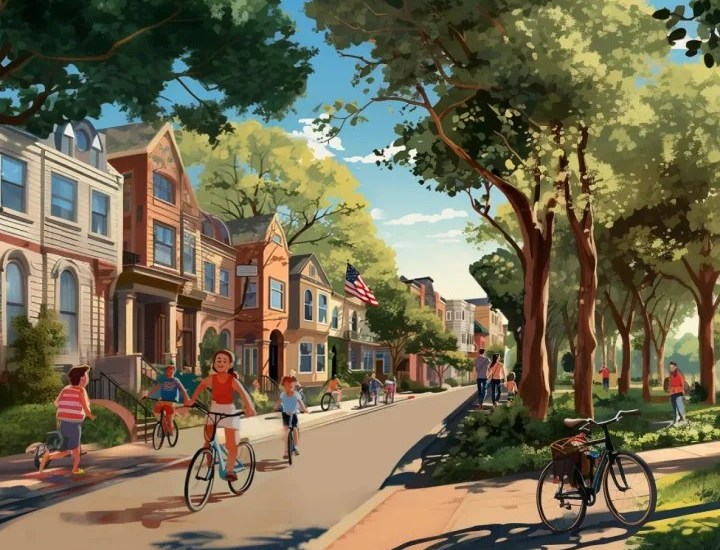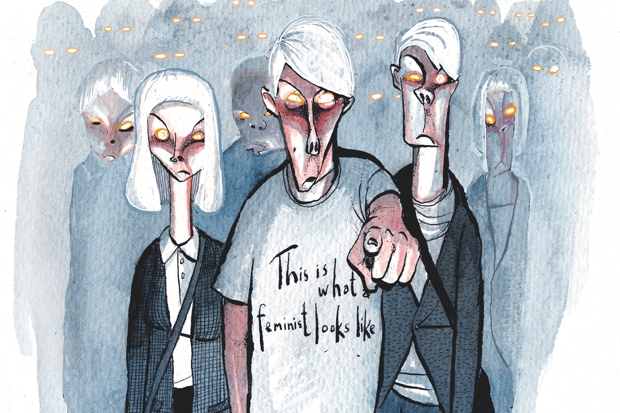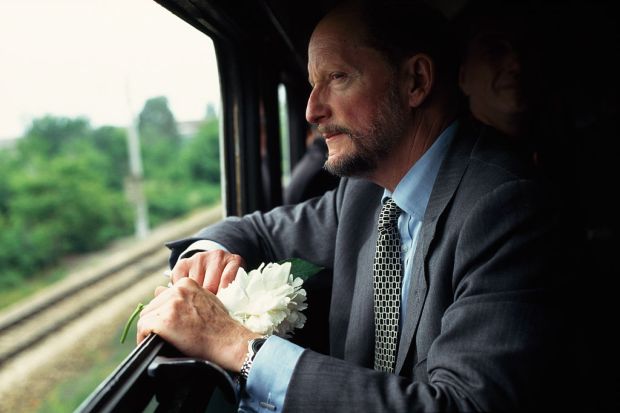It’s a peculiar thing about billionaires: they don’t half have a weak spot for building ideal communities from the ground up. You could call it pluto-utopianism.
The latest manifestation of this is California Forever. A number of ultra-wealthy Silicon Valley tech entrepreneurs have been quietly buying up 55,000 acres of farmland in Solano county, California, and at the end of last week they launched a website revealing what they planned to do with it. Behold, the future of rural America: a new community rising from the empty earth, the vision for which is set out in a series of watercolour-style illustrations.
Here is a version of that anxiety transmitted into town-planning: a sudden burst of communitarian enthusiasm
What’s striking about the pictures is that, for a proposed community whose founding investors are almost all from Silicon Valley’s bleeding-edge tech firms, it looks (solar panels aside) like something dreamt up by Norman Rockwell, albeit with a telling flavour of Soviet social realism. Nowhere in any of these paintings can you see a Tesla, a private jet or a smartphone.
Everywhere are tree-shaded streets, pavement cafes, children on bicycles, people fishing from skiffs at sunset or drifting in kayaks, and 1950s-looking homes with Old Glory hanging discreetly from a flagpole. The relationship with a nearby US airforce base is illustrated with a retro-looking cargo plane. The only image of transportation is of a tram mingling with happy pedestrians.
The mission statement on the website has a boldfaced pull-quote announcing that when California Forever polled locals last month ’81 per cent of Solano parents we surveyed said that their kids won’t be able to find a future in their own neighbourhood when they grow up’. To hear them tell it, their scheme for this new community might have been hatched in response to the concerns of these residents:
Instead of watching our kids leave, we have the opportunity to build a new community that attracts new employers, creates good paying local jobs, builds homes in walkable neighborhoods, leads in environment stewardship, and fuels a growing tax base to serve the county at large.
These things all sound wonderful, of course. They also sound like a repudiation of all the things that the putative community’s investors made their money doing. Rural communities emptying out, culture and capital moving globally rather than locally, downward pressure on wages, ingenious means of tax avoidance, rampant economic individualism, vast energy consumption – all these are the things that made the triumph of Silicon Valley possible and which it in turn accelerated. It’s possible, I think, to detect in this something like buyer’s remorse, or even nostalgie de la boue.
We’re already familiar with the finding that Silicon Valley high-fliers tend to be fanatical about restricting their own children’s access to the smartphones and social media: they know all too well how harmful are the very technologies that have made them so rich. And here is a version of that anxiety transmitted into town-planning: a sudden burst of communitarian enthusiasm.
Everything, the website promises, will be done in ‘conversation’ with the residents of the county: ‘This is the beginning of our decades-long collaboration with Solano’s residents, elected officials and agencies, as well as the many Solano stakeholders.’ It wouldn’t do to presume – but I’d certainly be interested to see how that works out in practice.
We have, it should be said, been here before. Think, for instance, of Disney’s attempt to create corporate utopias in Celebration and Country Walk, as detailed in Carl Hiaasen’s excellent Team Rodent; the latter of whose wooden-framed houses turned out to be appealingly olde-worlde but rather less hurricane-proof than was wise. Or even of Prince Charles’s romantic dream of Poundbury, described by my colleague Stephen Bayley as ‘fake, heartless, authoritarian and grimly cute’.
My favourite instance was in the late 1920s, when Henry Ford decided to combine his desire to secure a reliable supply of rubber for his car tyres with the dream of creating a perfect traditional American community. The result was Fordlandia: a model American community complete with kitschy clapboard houses, fire hydrants, a cinema and a golf-course… next to a rubber plantation smack-dab in the middle of the Amazon jungle.
Ford had done so much to set in motion the forces that were to destroy small-town American life as it had been; now he saw no irony in his attempt to recreate a simulacrum of it by sheer force of will (and depth of pockets). Ford imagined a strict, wholesome old-world puritanism governing Fordlandia – and prescribed how the town should be run, what his workers ate and drank (he was mad keen on soybeans), and even how they were allowed to dance (square-dancing and quadrilles were okay; he feared that the ‘sex-dancing’ that was now so popular back home was Jewish).
Of course, it didn’t work out like that at all. Clapboard isn’t the ideal construction material for extreme heat and humidity, and if you drop a whole lot of people into a community based miles from home, as Joseph Conrad noted, they will tend to get on with doing what they like, even ‘sex-dancing’. Ford’s quasi-military security operation and network of informants did what they could to keep residents on the straight and narrow, but in vain. Fordlandia enjoyed two decades of disease, depravity and chaos before the jungle closed over it. The water-tower still stands, desolate, above the ruined town like a gravestone.
The paradox is that Ford, like the creators of California Forever, used money created by the frictionless operations of the global market to artificially create the sorts of communities that they imagine existed, organically, in an earlier and more innocent age. California, admittedly, is in some ways a more promising location for such an experiment in nostalgia than the rainforests of Brazil. But California Forever seems to me to tell us less about the future of rural communities than about yet another billionaire’s dream of their imagined past.
Got something to add? Join the discussion and comment below.
Get 10 issues for just $10
Subscribe to The Spectator Australia today for the next 10 magazine issues, plus full online access, for just $10.




















Comments
Don't miss out
Join the conversation with other Spectator Australia readers. Subscribe to leave a comment.
SUBSCRIBEAlready a subscriber? Log in